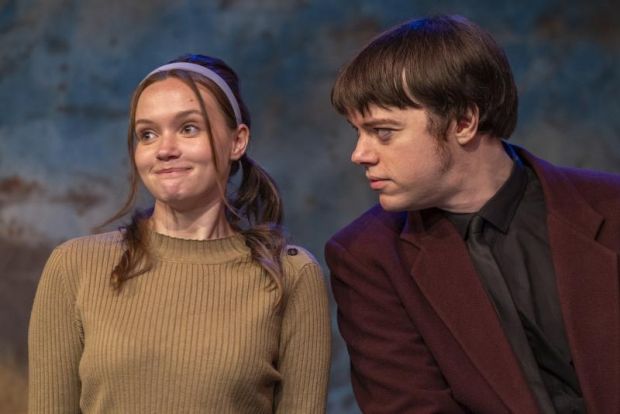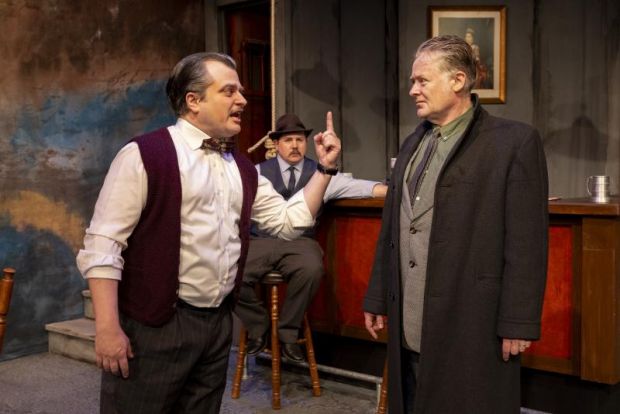Hangmen
One of the characters in Hangmen, Peter Mooney (Robert Snars), wants to be seen as “menacing” rather “creepy”. He is. Menacing that is. So are some of the other characters. In fact so is the play! But then it is Martin McDonagh so “menacing” should be expected … as well as very, very black. Hangmen is all of this – and Deborah Mulhall directs to extract every sinister, sadistic moment as well as the “dark, dark humour” that seeps through all McDonagh’s work.
The first scene in Hangmen occurs in northern England in 1963, when Harry Wade (Nathan Farrow), the “second best hangman in England” and his nervy off-sider Syd (Jack Elliot Mitchell) viciously beat then hang James Hennessy (Owen Hirschfeld), a man who shrilly protests his innocence to his last breath.
Zoom to 1965 and Harry’s pub in Oldham. Designed by Tom Bannerman, the pub is gloomy. Nooses hang from the ceiling – a tribute to Wade’s “service to the queen” who watches from a photo above the bar. Here, surrounded by his cronies, Wade is being interviewed by young reporter Doris Clegg (Georgia Nicholas) about his opinion on the forthcoming abolition of capital punishment.

Enter Peter Mooney. He’s from “the south”, well dressed, arrogant, but, yes, “menacing”! He suggests he might rent a room and Harry’s wife Alice (Sonya Kerr) asks for references. When he returns with the references, he meets their 15-year-old daughter Shirley (Kim Clifton), creepily chats her up, and arranges to meet her for a trip in his motorcar.
Later we find him in a café with Syd inferring that he has kidnapped Shirley to get back at Wade for that 1963 execution. Syd of course takes the story back to Wade, and when Mooney appears again, Wade goes into ‘hangman’ mode to find out what Mooney has done with Shirley …
McDonagh takes Harold Pinter’s “theatre of menace” beyond threatening cruelty to committing it. His insight into the viciousness of mankind and the bleak picture he paints of society are confronting – yet peppered with a distinctive form of black comedy that makes us laugh … albeit guiltily.

Mulhall allows her cast to find the minutiae that make McDonagh’s characters so appealing to actors. Short sentences, pauses, reactions, language. She keeps the direction tight, letting the tension build through the characters and the subtle changes in pace and rhythm that the dialogue and accents dictate.
The Wade who Farrow cerates is nasty, harsh. He assumes a mean superiority showing no respect to his sycophantic friends but expecting total respect from them. He struts and sneers, his temper and innate viciousness hovering just below the surface in every interaction.
Kerr makes Alice efficient, giving her poise tinged with a watchful edginess based on Wade’s moods and reactions. She knows when to calm things down – and when to retreat. Not much gets past her, especially menacing looking customers. As a mother she is protective but sick of Shirley’s moodiness.

Kim Clifton shows that moodiness most effectively – and the naivety that Mooney plays on as he smarmily gains her confidence.
Mooney is not a nice character. He’s cunning and calculating and Snars finds this in disparaging expressions, scornful reactions, long pauses carefully timed, and tiny seemingly insignificant gestures that suggest contempt. He is menacing but is he a match for Wade?
Poor Syd Armfield is McDonagh’s ‘fool’ and Mitchell underplays the character skilfully. His timing is perfect, his reactions and delivery breaking the tension, even in the darkest moments of the play.

Wade’s foils – the ‘regulars’ at the pub played by Gerry Mullay, Reuben and Tom Massey – provide a different type of humour as they kowtow to Wade, or in the case of the local police Inspector (Alastair Brown) blatantly ignore his criminal behaviour.
Wade’s ‘bête noire”, Albert Pierrepoint, the ‘best hangman in England” is played by Jim McCrudden. Though he is part of the action for only a short time, McCrudden makes the most of this role, matching Wade’s malice with a more urbane malevolence and style.
Deborah Mulhall gathered a talented creative team to set the dark atmosphere and authenticity of this production. Helen Kohlhagen’s costumes conjure the period and style. Timothy M Carter’s subtle changes in lighting heighten the menace, as do Jim McCrudden’s original music and Mulhall and Mehran Mortezaei’s sound design. Mark G Nagle, as dialect coach, verifies McDonagh’s carefully phrased dialogue.

This is a carefully envisioned, directed and performed production that palpably finds what Mulhall calls the “despair and bruising” that drives McDonagh’s characters.
Carol Wimmer
Photographer: Bob Seary
Subscribe to our E-Newsletter, buy our latest print edition or find a Performing Arts book at Book Nook.

